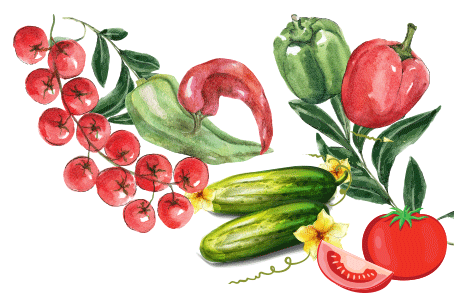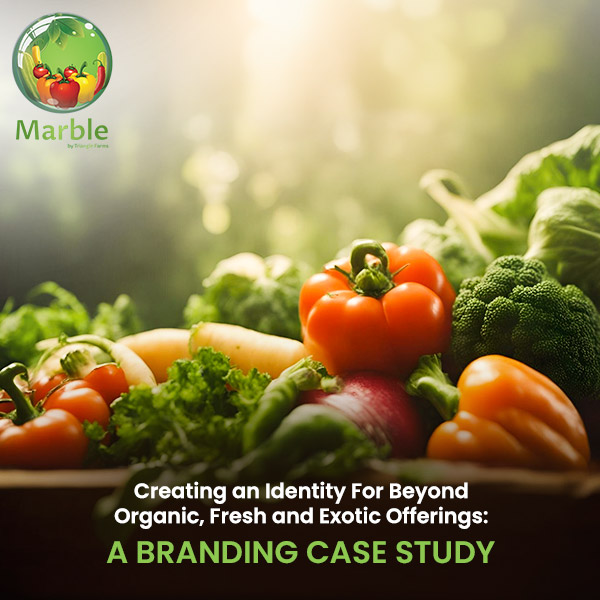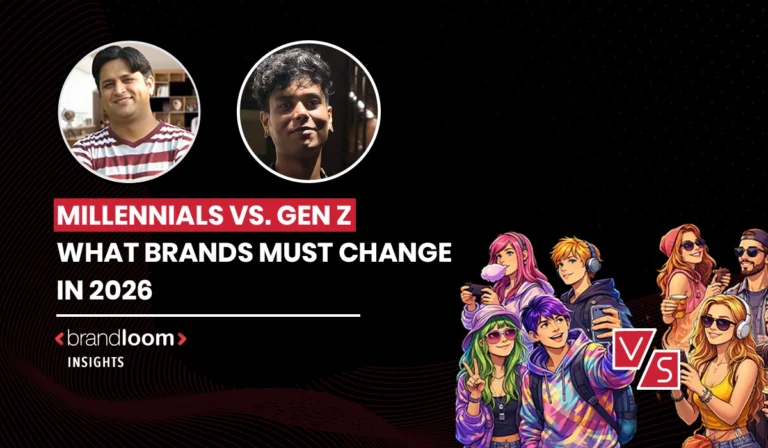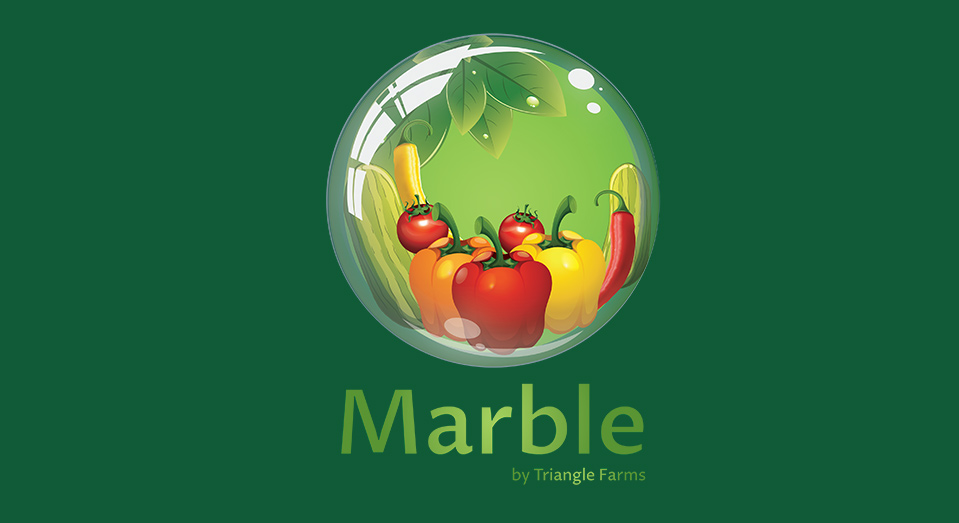
Marble by Triangle Farms Branding Deck
Background
Triangle Farms is a new company which aims to revolutionize farming in India. Hailed by enthusiastic people from the tech background, Triangle Farms combines the best of indigenous agriculture with cutting edge technology to produce premium quality exotic vegetables right here in India.
Not only did they want to provide their customers with the best products, but they also wanted to highlight what makes them different. Triangle Farms were bringing some advanced farming technology – which was not only novel in the Indian context but also marked a definite push towards sustainability.
They wanted to establish why their products were a class apart than the other vegetables the customers were getting in the market. Triangle Farms also wanted to reach out to the customers and the distributors simultaneously, so that they could create a niche for their products.
Triangle Farms wanted to stand out from the very start, and change the expectations of the customers about the vegetables they were buying.
The Problem Statement
Triangle Farms were entering the market when the urban population especially, were getting more careful about what they eat. The educated urban families were health-conscious and were looking to incorporate more healthy food in their diet. As a result, there was a growing demand for good quality, nutritious vegetables.
This class of customers were not only looking for eating healthy, but they were also looking for newer options to tickle their taste buds. The availability of exotic vegetables also presented them with more choices.
While the customers were ready to pay (slightly) more to get high-quality vegetables, the prevailing perception was that the only way to eat healthy was to go for organic produce.
Hereby lay the challenge – Triangle Farms were cultivating their vegetables using the hydroponic method, which was not organic but offered even better results. However, the customer was unaware of this advanced farming technology and the benefits it presented.
The other challenge was to find a market niche for the products. Triangle Farms needed the perfect name, logo and brand story for their line of products. They needed a brand story that would emotionally connect with the audience, and also make it clear to them that their products were the best ones available in the market.
In short, Triangle Farms needed to start their branding exercise from scratch, and also convince their customers that what they were offering was healthy, tasty and unique.
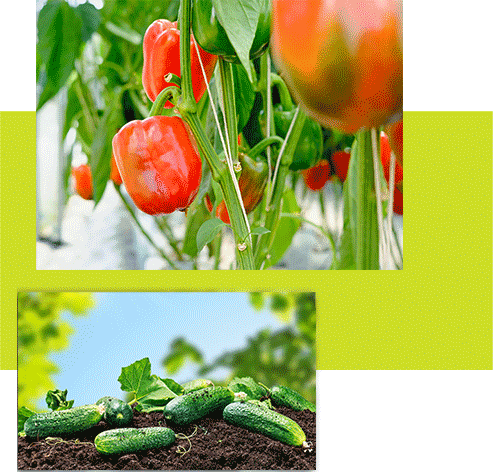
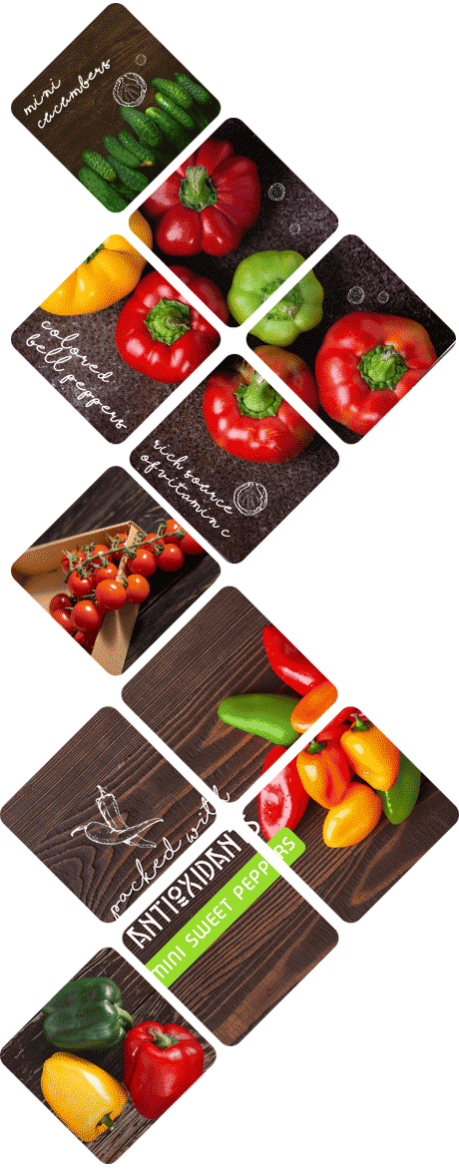

Strategic Brand Analysis – The BrandLoom Process
BrandLoom’s task here was to build a brand from the grounds up- right from finding the perfect name for it to create a market niche for it which was distinct from the competitors.
To do so, BrandLoom set forth with a step-by-step plan:
- Understanding the market
In India, exotic vegetables were becoming more popular. Not just the metro areas, there was a growing demand for them in tier II and tier III cities as well. Many consumers were looking for them online and were also visiting the supermarkets regularly to stock up on exotic vegetables.
However, the bulk of the available vegetables in this category were mostly limited to green, red and yellow bell peppers, zucchini and broccoli.
On the other hand, there was the organic food market. Of late, there has been a growing demand for organic produce, because these are pesticide and chemical-free, and healthier than mass-produced vegetables available in the market.
However, organic produce was also more expensive, and its supply was unsure. Organic produce was also available in limited quantities, and only in select places.
Looking at the market, BrandLoom understood that there was a niche for the vegetables that Triangle Farms produced. Triangle Farms was producing high-quality vegetables with the help of hydroponic technology- which ensured year-round supply, increased yields and more affordable prices.
At the same time, the exotic vegetables available did not have any emotional connect with the end customer. Triangle Farms had the opportunity to build a brand and its brand story, which would resonate with the customers. This also meant that they could create a market niche completely distinct for its customers.
2. Who were the customers?
Our next step was to understand who were the customers. To form a profile of the intended customer, we looked at the people who were buying exotic vegetables. We found that:
-
- They came from urban families and could afford to buy vegetables from the supermarkets.
- The customers were also family-oriented and were trying to serve the best for their children like their own parents used to do for them.
- These customers were health-conscious- they wanted to eat healthy, and also know where their food came from. They wanted to avoid foods laden with chemicals and also look for foods that would be high on nutrition but low on calories.
- They were also more socially conscious. They were looking sustainably grown food and wanted to support environmentally conscious businesses.
- The customers were looking for high-quality food at affordable prices. The Indian customers are notoriously price-sensitive. So, while they were willing to pay (slightly) more, they would not regularly buy vegetables that were exorbitantly priced.
- The new-age customers were also looking at more variety of exotic vegetables and were ready to experiment with different kinds of food.
3. How was Triangle Farms giving them what they want?
Triangle Farms’ biggest strength was that it was producing high-quality vegetables at affordable prices. At the same time, their produce was giving an alternative to organic vegetables- which had certain drawbacks.
While not organically cultivated, hydroponic technology ensured a sustainable method of production. With this method, they could control the growing conditions and provide protection against inclement weather and pests- which automatically translated into consistent, good quality produce. Moreover, this method reduced wastage, and harvest being mechanized, it prevented the vegetables from being contaminated by any human contact.
Furthermore, Triangle Farms were introducing more exotic vegetables. Apart from green, red and yellow bell peppers, their kitty included orange bell peppers, sweet peppers, mini cucumbers, seedless English cucumbers, red cherry on the vine tomatoes, tomatoes on the vine and beefsteak tomatoes. This meant that customers could get more variety here.
What was needed now, a brand name and a brand story which would encapsulate the goodness that Triangle Farms were offering.
The Action Plan
Conceptualizing the brand identity for their line of products
We worked with them to find the right brand name and brand story. We suggested many names – and finalized “Marble”.
We wanted a brand name that would encapsulate the goodness of what they were offering.
We built a brand story that connected their product with their brand name and forged an emotional connection with their customers.
“Marble” harkened back to the days of childhood which were associated with fun and family. With a strong sense of nostalgia inherent in it, BrandLoom wanted to forge an emotional connect with the customers who wanted to gift their families with the best- nutritious vegetables which were as colourful as the marbles that they played with during their childhood.
Apart from that, we wanted to differentiate Marble as a brand which was producing high-quality vegetables that were even “better than organic”. To do so, we highlighted the advanced technology they were using to cultivate their vegetables- which tied in with how Triangle Farms was painstakingly producing something which would delight the customers. They were doing so in a sustainable manner.
Most importantly, we wanted to showcase the variety of vegetables that Marble was offering- some of which were not available in India otherwise. At the same time, it was essential to highlight that all these exotic vegetables were now being grown in India- and Marble was a game-changer in its field.
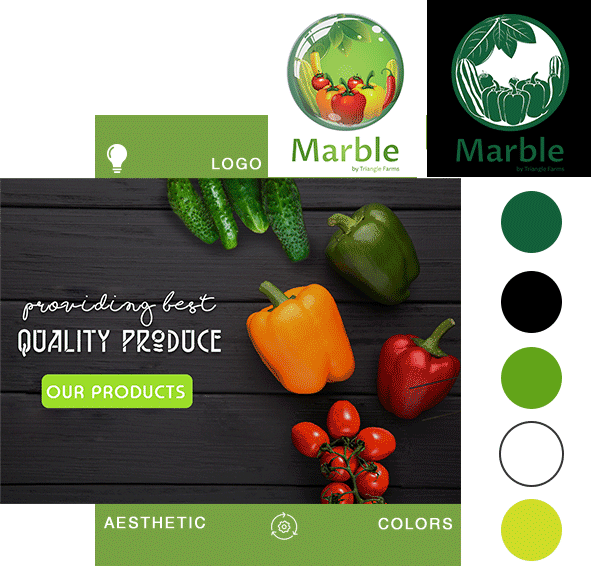
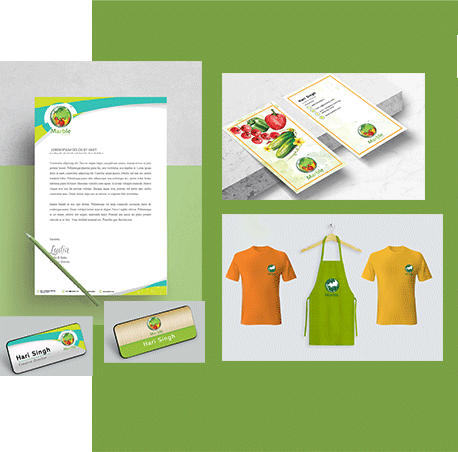
Establishing their visual identity
This started with designing the right logo. The logo depicted a transparent marble in which you could see the colourful bounty of the exotic vegetables they were offering. It was a logo which represented the freshness of nature and showcased a selection of their products.
Rendered in bright colours against a green background, the logo called back to a strong connection with nature and freshness. The transparency of the marble also hinted at the business value that Triangle Farms followed. Be it the customers or their B2B partners- this was a company that was going to be honest about what they were offering.
BrandLoom also helped design their corporate visual identity and the brand collaterals. The stationary accordingly followed this aesthetic and even depicted exotic vegetables on select items. This immediately made the brand visually compelling, and memorable-which would come in handy when forging B2B relationships.
Digital branding identity
BrandLoom created its website, capturing an aesthetic that captured the freshness associated with nature. We used the colors which recalled the colors of the exotic vegetables they grew; and contrasted them against a background which captured the transparent effect of a marble. The combination of the watery background with the soothing but bright yellow, green, orange and tones were at once eye-catching and calming.
We showcased the exotic vegetables they were producing in the best way possible and talked at length about their nutritional benefits.
The brand’s website also talked about how they are going beyond organic farming, and how that is ensuring even better-quality products for the customers. The distinguishing feature to focus on was that Marble’s products were “better than organic”. As a result, on the website, the content went at length to depict the hydroponic growing process.
This was a critical facet to highlight- because their cutting-edge farming technology set Triangle Farms apart from their rivals. Competing brands could not claim to be sustainable or advanced in their growing methods. Marble’s products were going beyond organic- and this was its USP.
Moreover, Marble’s portfolio was considerably more diverse than what other vegetable growers were offering. It contained mini cucumbers, sweet peppers, red cherry on the vine and beefsteak tomatoes- apart from other vegetables- which were a novelty in India. The website featured all these vegetables and described their features and nutrition profiles, which would hook the audience in.
At the same time, packaging information was provided for each product, which could be checked by B2B partners and suppliers; in the interest of transparency in business.
Since sustainability was the core of what Triangle Farms were doing, we highlighted all how the company was positively impacting their community. From generating employment to reducing wastage, to gender-friendly HR policies and environmentally sustainable way of operating- we showcased how sustainability was not merely limited to their method of cultivation.
4. Raising awareness and connecting with the customers
Through a series of blogs, BrandLoom focused on raising awareness about hydroponic technology- which was the distinguishing feature for Triangle Farms. The blogs talked about the technology, its advantages, and how vegetables grown hydroponically had many advantages over organic produce.
Apart from that, we also talked about the exotic vegetables and their nutritional values in the blogs. The purpose of this was educating the audience about the goodness that Marble was serving- and why the former should include exotic vegetables in their diet.
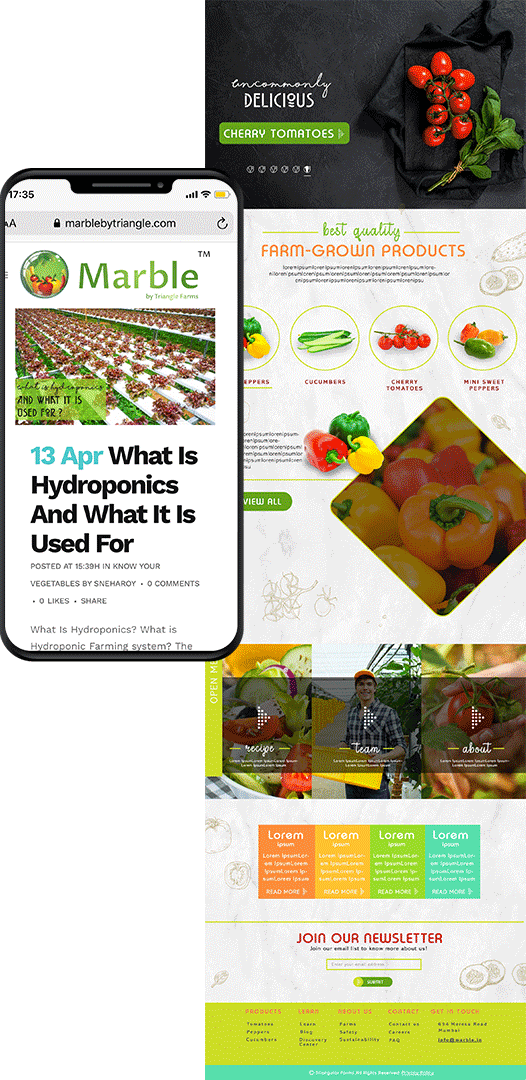
Establishing The Brand
BrandLoom established Marble as a brand that gave customers the best that nature has to offer. We found a niche for it where its products could distinguish itself from their rivals that did not have any emotional connect with the customers, and had considerably less variety of products to offer.
We positioned Triangle Farm as a company with values. We talked about how they are bringing their customers the best quality products; while also not compromising on affordability, sustainability, transparency and community empowerment.
Our branding exercise established Marble (and Triangle Farms) as a one-of-a-kind brand in India. It carved out a strong market niche for itself and expertly communicated what made it different from its competitors and made it memorable for its customers.
